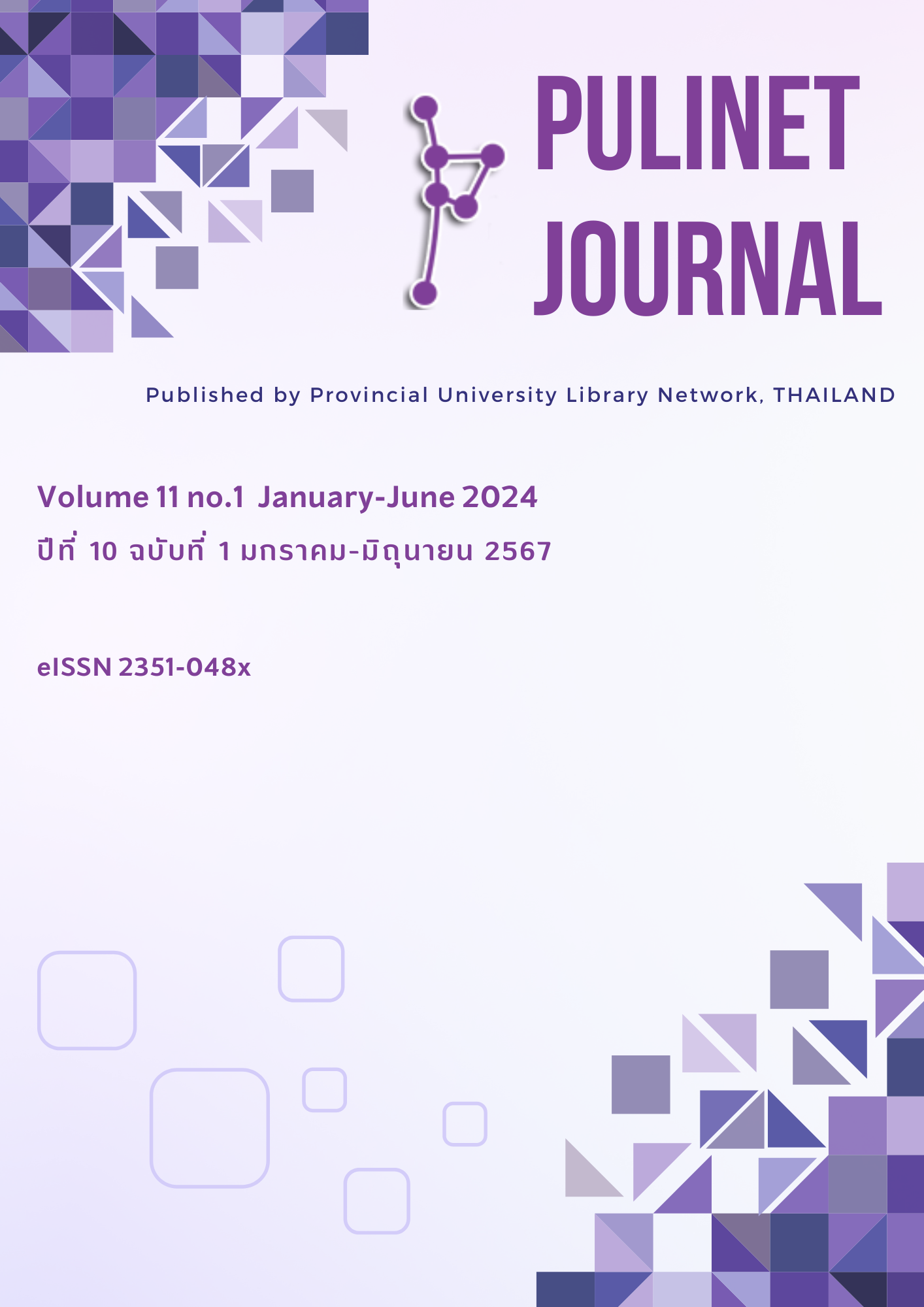การจัดการพื้นที่ตามแนวคิดใหม่ Library of Life
Main Article Content
บทคัดย่อ
งานวิจัยนี้มีวัตถุประสงค์เพื่อออกแบบการบริหารจัดโซนพื้นที่หอสมุดฯ ให้สอดคล้องกับความต้องการที่เปลี่ยนแปลงไปของผู้ใช้งาน Generation Z รวมไปถึงเพื่อศึกษาปัจจัยที่ทำให้เกิดความพึงพอใจต่อการจัดโซนพื้นที่หอสมุดฯ ตามแนวคิดใหม่ Library of Life กรอบวิธีวิจัยเป็นแบบผสม (Mixed Method) ทั้งเทคนิควิจัยเชิงคุณภาพและเชิงปริมาณ โดยดำเนินการเป็น 4 ขั้นตอนหลัก ได้แก่ (1) การกำหนดกรอบแนวคิดในการบริหารโซนพื้นที่ (Conceptualization) (2) การพัฒนาเครื่องมือเก็บข้อมูล (Instrument Development) (3) การจัดเก็บข้อมูล (Data Collection) และ (4) การวิเคราะห์ข้อมูลและอภิปรายผล (Data Analysis And Discussion) ผลการวิจัยพบว่าการออกแบบการบริหารจัดโซนพื้นที่หอสมุดฯ ให้สอดคล้องกับความต้องการที่เปลี่ยนแปลงไปของผู้ใช้งาน Generation Z ควรจัดพื้นที่อย่างน้อย 4 โซน โดยโซนพื้นที่ทำงานร่วมกัน (Meeting Space) มีนัยยะต่อการสร้างความพึงพอใจแก่ผู้ใช้บริการสูงสุด รองลงมาคือ พื้นที่การเรียนรู้ (Learning Space) พื้นที่แสดงความสามารถ (Performative Space) และพื้นที่สร้างแรงบันดาลใจ (Inspiration Space) ตามลำดับ นอกจากนี้ การจัดการพื้นที่แนวใหม่ (Life Space) สามารถสร้างความพึงพอใจแก่ผู้ใช้บริการ Generation Z ได้ใน 2 มิติ โดยอันดับที่ 1 คือความพึงพอใจต่อความเหมาะสมของพื้นที่และตามมาด้วยความพึงพอใจต่อประสบการณ์ที่ได้รับจากการใช้พื้นที่
Article Details

อนุญาตภายใต้เงื่อนไข Creative Commons Attribution-NonCommercial-NoDerivatives 4.0 International License.
เอกสารอ้างอิง
เดอะ คอมมอน (The KOMMON). (2564). ห้องสมุดเป็นจุดหมายการท่องเที่ยว. https://www.thekommon.co/library-travel/
ปราณี อัศวภูษิตกุล. (2561). พื้นที่การทำงานร่วมกันของห้องสมุด. วารสารห้องสมุด. 62(1), 1-15. https://so06.tci-thaijo.org/index.php/tla_bulletin/article/view/132608/99536
มหาวิทยาลัยธรรมศาสตร์. หอสมุดแห่งมหาวิทยาลัยธรรมศาสตร์. (2565). วิสัยทัศน์ หอสมุดแห่งมหาวิทยาลัยธรรมศาสตร์. https://library.tu.ac.th/bbs/content/94_460
มหาวิทยาลัยธรรมศาสตร์. (2564). แผนยุทธศาสตร์มหาวิทยาลัย ฉบับที่ 13. วิสัยทัศน์. https://pr.tu.ac.th/journal_special/2565/Strategic-Plan-No-13/index.html
อนุสรณ์ เรือนดารา. (2566). Gen Z กับ 5 เทรนด์ ปี 2023 พวกเขาต้องการอะไร [LIFESTYLEASIA]. https://www.lifestyleasia.com/bk-th/culture/people/5-trends-gen-z-2023/
Julong Media. (ม.ป.ป.). “TCDC Resource Center” ห้องสมุดด้านการออกแบบที่ดีและล้ำสมัยที่สุดในไทย. https://www.lifestyle224.com/content/11862/tcdc-resource-center
Little Thoughts. (2021). Library Oodi ห้องนั่งเล่นขนาดยักษ์ใหญ่ที่เต็มไปด้วยหนังสือของคนฟินแลนด์. https://adaymagazine.com/library-oodi-helsinki/
Taiwan Tourism Administration. (ม.ป.ป.). ห้องสมุดสาธารณะ เมืองเถาหยวน (Taoyuan City Public Main Library). https://www.taiwantourism.org/th/where-to-go/taoyuan-city-public-main-library/
Cha, S.. H., & Kim, T. W. (2018). The role of space attributes in space-choice behaviour and satisfaction in an academic library. Journal of Librarianship and Information Science. 52(2), 399–409.
Choshaly, S. H., & Mirabolghasemi, M. (2019). Using SEM-PLS to assess users satisfaction of library service quality: evidence from Malaysia. Library Management, 40(3/4), 240-250.
Hair, J. F., Black, W. C. Black, Babin, B. J., and Anderson, R. E. (2010). Multivariate Data Analysis. Prentice Hall.
Jochumsen, H., Skot-Hansen, D., and Hvenegaard, C. (2010). A new model for the public library in the knowledge and experience society. https://staticcuris.ku.dk/portal/files/173562136/A_new_model_for_the_public_library.pdf
Khongmalai, O. & Distanont, A. (2018). Research Techniques in Technology and Innovation Management. Thammasat University Publisher.
Li, L. H., Wu, F., & Su, B. (2018). Impacts of Library Space on Learning Satisfaction – An Empirical Study of University Library Design in Guangzhou, China. The Journal of Academic Librarianship, 44 (6), 724–737. https://doi.org/10.1016/j.acalib.2018.10.003
Lindeman, R. H., Merenda, P. F., & Gold, R. Z. (1980). Introduction to Bivariate and Multivariate Analysis. Scott, Foresman and Company.
Ozlem, E.. O., & Çigdem T. (2017). An investigation of factors that affect internet banking usage based on structural equation modeling. Computers in Human Behavior, 66, 232-235. https://doi.org/10.1016/j.chb.2016.09.059
Younghee, N. (2020). The analytic study of librarian-user and importance-satisfaction on the use factor of complex cultural space in library. Library Hi Tech, 40(6), 1532-1566.
Zha, X., Huang, C., Yan, Y., Yan, G., Wang, X., & Zhang, K. (2019). Understanding extended information seeking The perspectives of psychological empowerment and digital libraries attachment. Aslib Journal of Information Management, 72(5), 705-724.
Zhang, Z. (2019). The effect of library indoor environments on occupant satisfaction and performance in Chinese universities using SEMs. Building and Environment, 150, 322–329. https://doi.org/10.1016/j.buildenv.2019.01.018
Zhengwei, M., Guanglin, P., Xiucheng, D., & Chi, C. (2017). The situation analysis of shale gas development in China-based on Structural Equation Modeling. Renewable and Sustainable Energy Reviews, 67, 1300–1307.
Zhou, J., Lam, E., Au, Hang. C., Lo, P., & Chiu, K.W. D. (2021). Library cafe or elsewhere: usage of study space by different majors under contemporary technological environment. Library Hi Tech, 40(6), 1567-1581.


